Feral Rizvi
Figuring things out
I’ve always enjoyed finding ways to improve any situation I’m in. This site is where I share problem-solving approaches, lessons from challenging experiences, and moments worth remembering.Welcome! ようこそ!This space is still evolving—feel free to explore 🧭
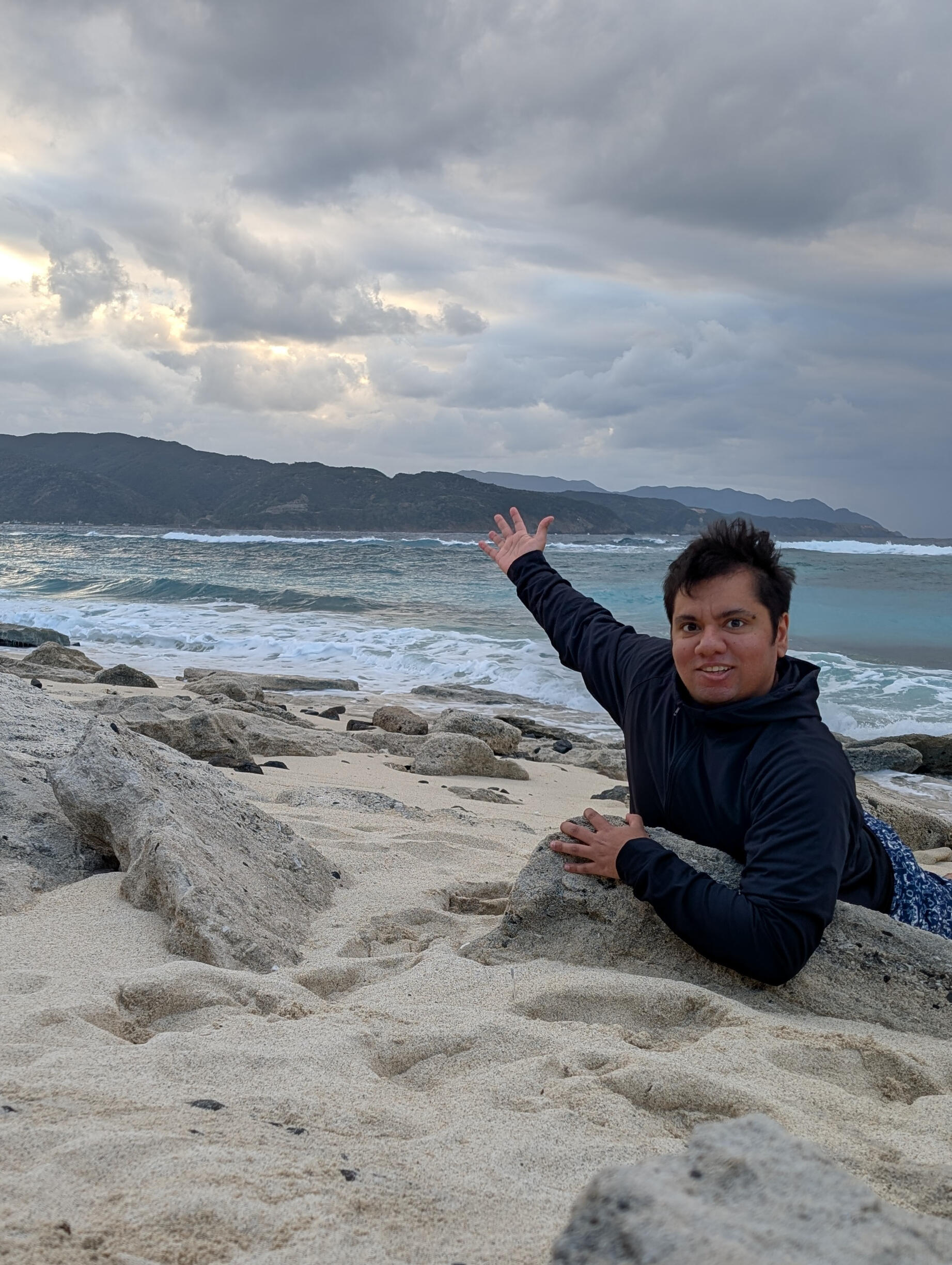
© 2023-2025 Feral Rizvi. All rights reserved.
About
Hi, I’m Feral—I go by Ferry in Japan. 初めまして。フェリーです。よろしく!I work at a fintech company in Tokyo, and outside of work, I enjoy traveling, surfing, making ceramics, running/strength training, and saunaing.🗼💹🌎🌊🍶👟♨️❤️I started this site after reading Show Your Work! by Austin Kleon in late 2023. I knew I wanted to share more of my thoughts and ways of approaching things, but I wasn’t sure how. That book helped me figure out the steps to start.At my core, I value clarity, authenticity, and fairness. I strive to create environments where people feel seen, included, and heard. I use humor to navigate difficult situations and believe that transparency helps people navigate uncertainty. My strengths lie in identifying dysfunctional team patterns, replacing them with collaborative practices, and cultivating trust through open dialogue.This space is still evolving, but if any of these ideas resonate with you, feel free to explore!
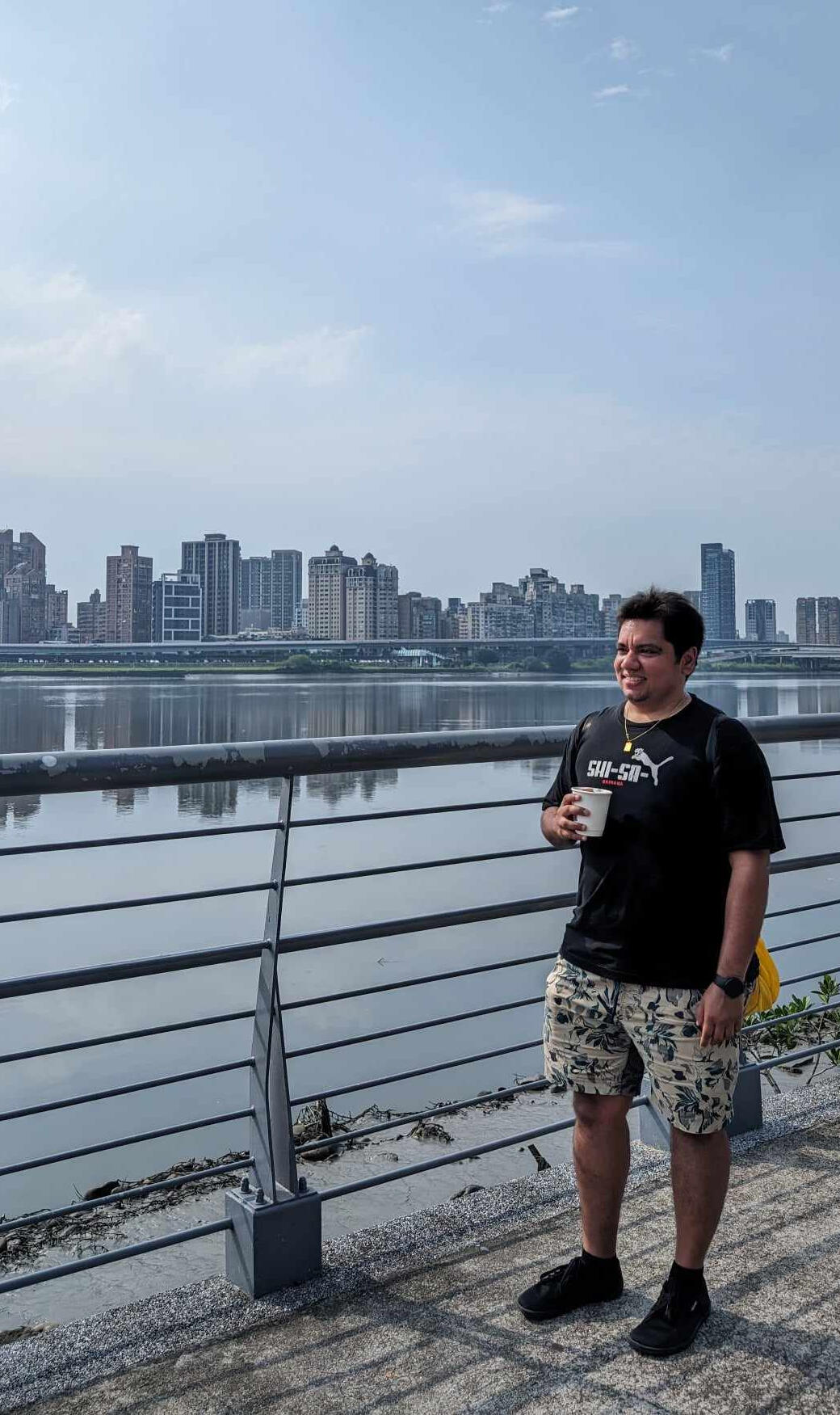
Blog
Hoping to use my blog to keep a record of notable moments and learnings as I encounter them!
Crafting My LinkedIn Photo Using AI
1-Sept-2025
I’d been thinking for a while that my LinkedIn profile needed a refresh.Specifically, a proper headshot. I had already met a photographer at a networking event, and I figured it was the perfect chance to finally get one done.I reached out, asked about their rates, and they came back with a quote: 25,000 yen (about $170 USD) for a 30–60 minute session.Apparently, according to Gemini, that’s pretty standard pricing for professional photographers in Tokyo. But still, I thought that's a lot of cash to drop for photos that were only going to be used for LinkedIn.I started looking for cheaper options. That’s when I noticed a bunch of AI headshot tools being advertised online: $24 USD for a full set of portraits. Way more within my comfort zone of what I was willing to spend on this.And then I thought: if there’s an AI tool doing this, why can’t I do it myself?I already had a paid Gemini and Prompt Perfect subscription, so I decided to give it a try. Over the course of one evening I did some prompting sessions on my phone on the train on the way to an event, then on the way back and finally a little more at homeAll in all, maybe 2 to 3 hours of tinkering.I first started with the photos I have on hand of myself (all casual):
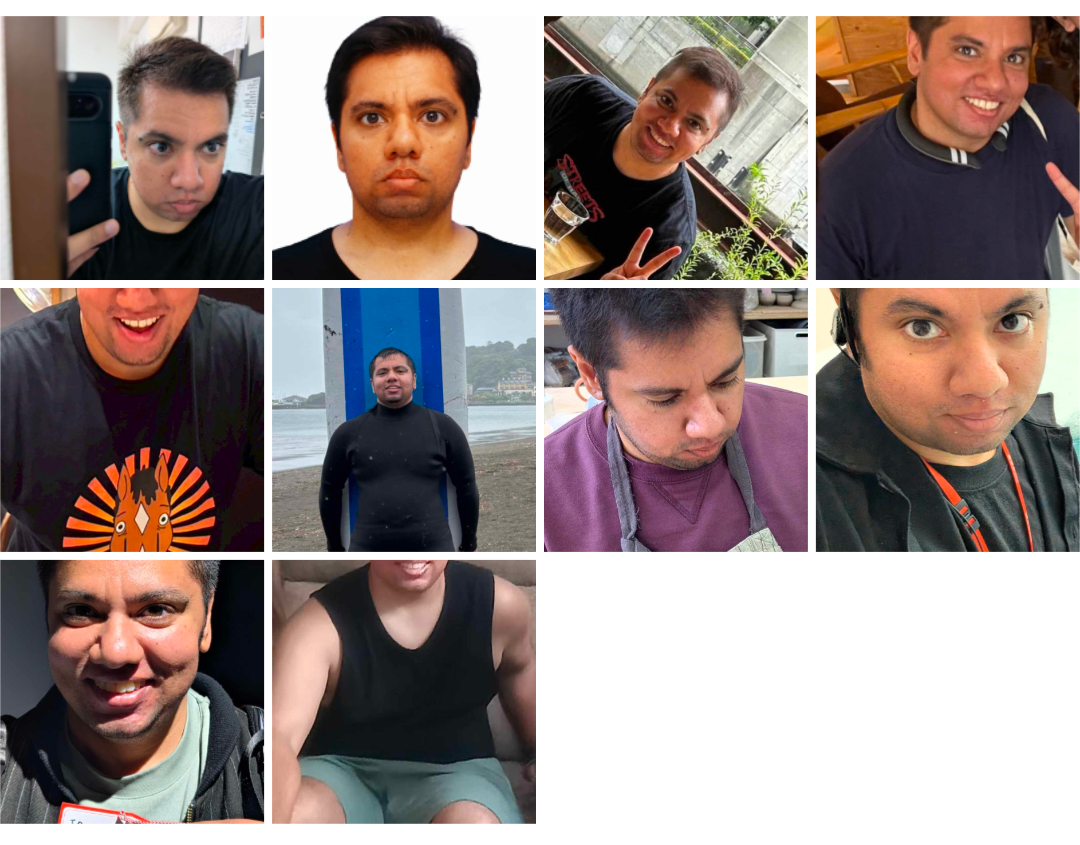
And at first, the results weren't bad:

It captured what I fundamentally wanted but it still had this fuzzy, "AI made this" look about it, especially when you look at the tie, parts of the suit, and my mouth.Then things started to get … weird. It really started making me look like someone else entirely, but ... they could be related to me?

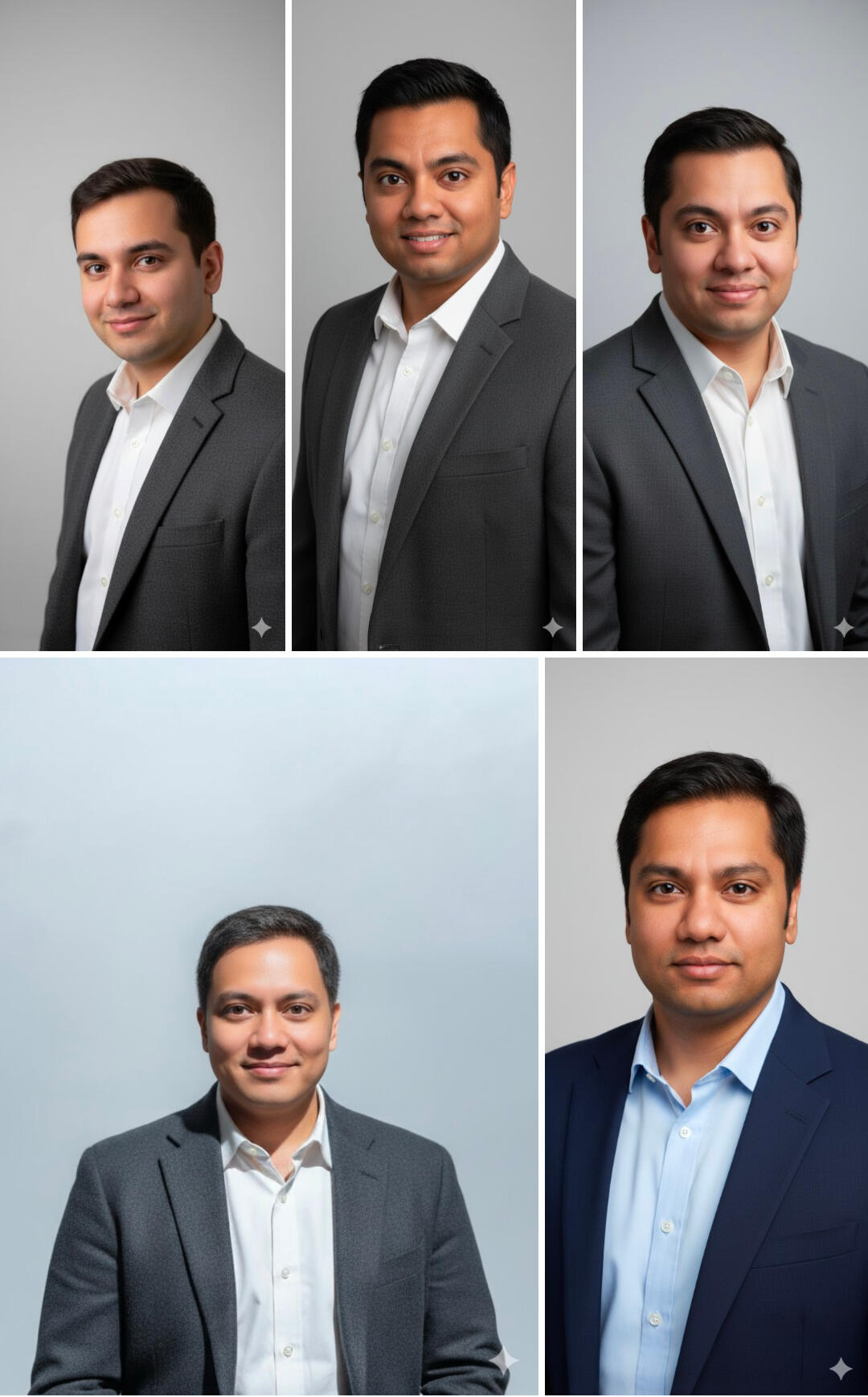
The more I tweaked my prompts and adjusted the source images, the closer it got to what I had in mind. I started to use the some of the AI generated images that I kind of liked as source images as well:
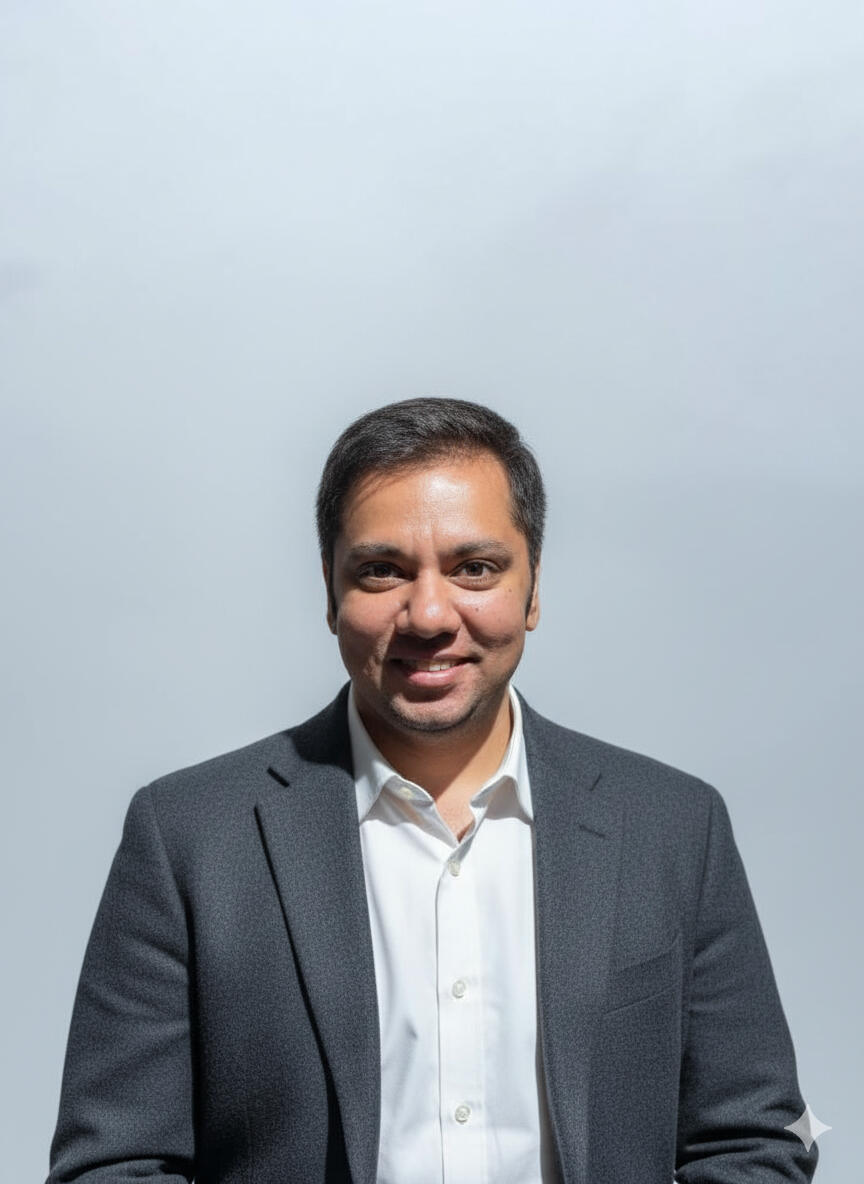
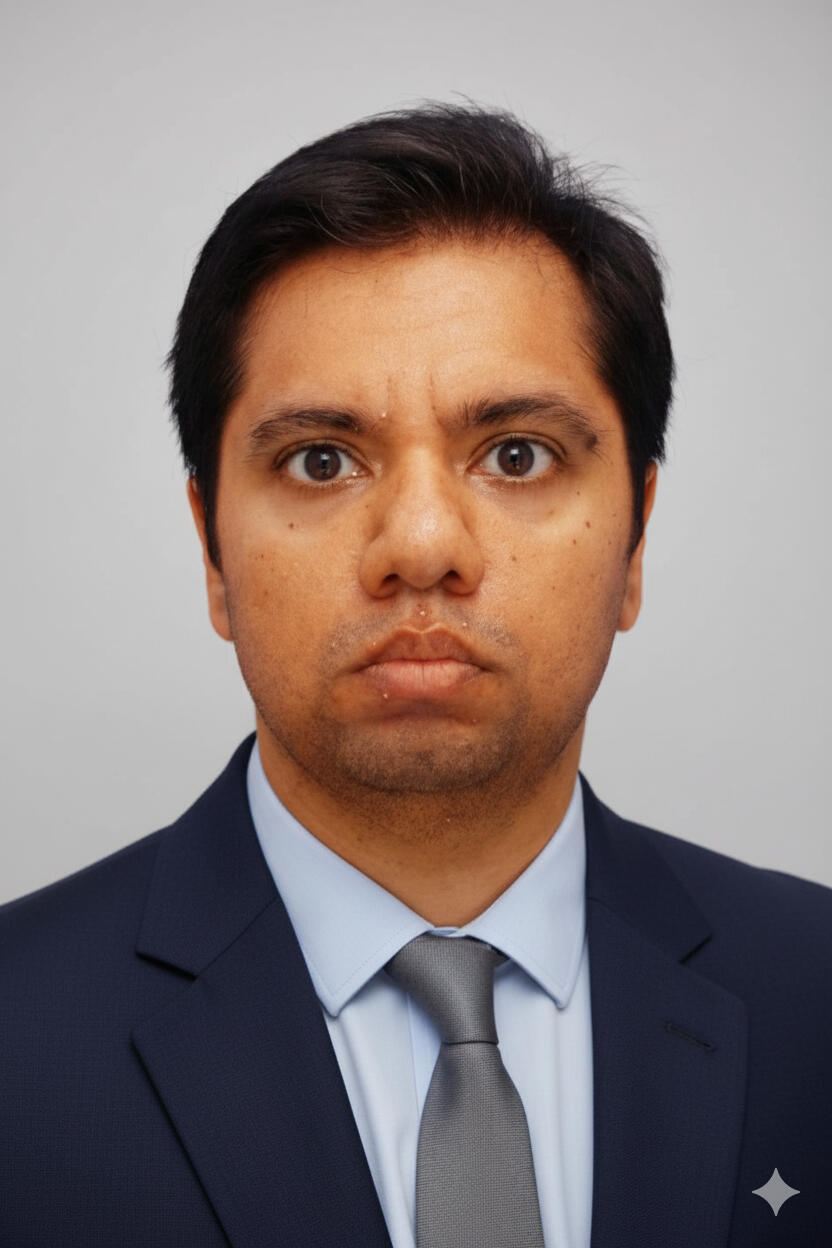
Then finally, there it was ... a polished, professional, and surprisingly natural portrait that actually looks like me:
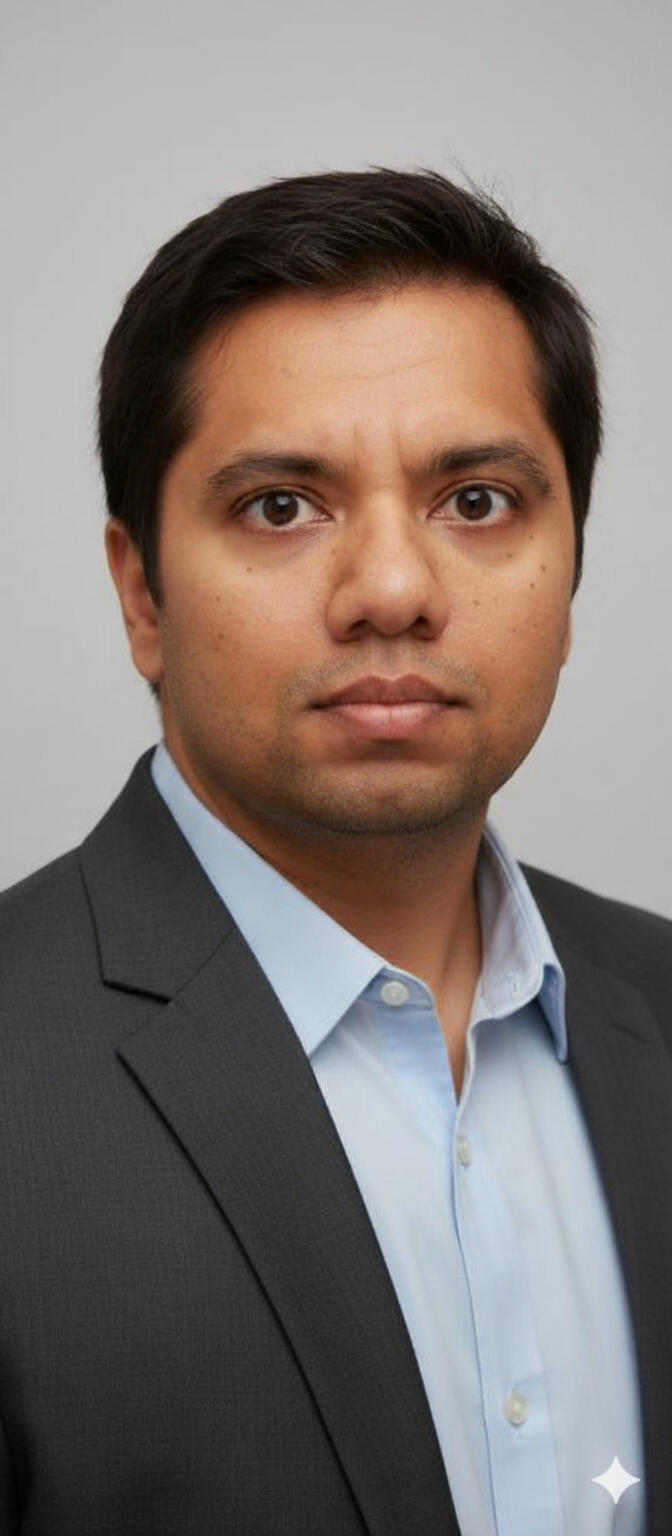
After using the auto-frame feature on Google Photos to create more room and an angle, that AI-generated headshot is now my LinkedIn profile picture.That’s pretty crazy! All it took was 20 prompt sessions within 3 hours, with nothing but a few previous photos (10 per prompt limit), a Gemini subscription, and a Prompt Perfect subscription.Here's the prompt for those that are curious:
"Create my professional headshot, realistic photography, soft light gray background, studio lighting, business attire that complements skin tone, neat blazer and button-up shirt, shoulders and head, realistic facial features, natural expression, photographic quality, LinkedIn profile style, avoid AI-generated appearance --ar 4:5 --v 6 --style rawI should be able to use this picture in my real LinkedIn profile"
The times we're living in ...
P.S.: Also recently heard that Nano Banana was released on Aug 26, the day before I did my prompting on Aug 27. I used 2.5 Pro for my prompting on Gemini, so it's very likely it was using Nano Banana in the background. This is no doubt a huge step up when it comes to image generation.
Reducing Screen Time, and Redefining Rest
18-May-2025
Changing how I defined rest changed everything for me.I had been tracking my phone screen time for the past 6 months and found myself spending an average of 4 hours a day, with the largest spikes happening in the evenings. The days that I spent more than 3 hours, I noticed I was really low on energy by the end of the day and struggling to fall asleep.Near the end of April, I found myself sick with another viral infection that latched onto my throat. My doctor had told me to rest. And for the longest time, I thought “rest” meant lying in bed watching YouTube, TV, or something else to completely disassociate while on medication. Essentially, more screen time 😅That’s what I saw growing up. That’s what everyone around me did when they were sick or recovering. It was the only model of rest I knew.But over time, I noticed that kind of “rest” wasn’t actually helping me recover. It felt passive and numbing, and I was relying completely on the medicine to do all the heavy lifting while I mentally checked out of my own body. Anything to avoid the scratchy throat, throbbing laryngeal pain, and aching muscles...😭And honestly, maybe that kind of escapism works for acute pain or the first 24–48 hours of getting sick. But beyond that? I think it was making things worse, not better.Discovering a New Way to Think About RestOne day, deep in a YouTube spiral while sick, I stumbled across "I'm A Potato Hour" by WISE JOE.There was something about it that hit differently.The way he talked about the power of doing nothing felt so counterintuitive, and yet so exactly what I needed. I had been trying to solve my screen time problem by restricting myself and creating new rules. But what if I just did something else? What if, instead of trying to avoid the screen, I replaced the habit with lying down and doing absolutely nothing?My First Attempt
Once I recovered, I wanted to give "Doing Nothing" a shot. The first time I tried it, I didn’t want to lie in bed because I knew I’d fall asleep. So I lay down on the floor, stared up at the ceiling, and just... lay there. It felt kind of funny.But something unexpected started happening. After about 5 or 10 minutes of thinking about how silly this was, ideas began to bubble up—like popcorn.“Maybe I should start mapping out people's product team assignment by component team on Miro ...”“What if I tried to measure meetings by Return on Time Invested using 10,000 yen as a starting amount?”"I wonder what Nonki Bistro is like ... maybe I should go there tomorrow!"Some of those ideas would keep circling around in my head, and I’d grab a notepad, jot them down, and go back to lying down. No pressure to do anything with them. Just write, release, return to stillness.The Aftereffect
After 30 to 45 minutes of doing nothing, I got up feeling refreshed. Not numbed, not distracted—clear.It was a different kind of clarity than I’d ever gotten from scrolling. My brain felt lighter. As I got up, my immediate next steps came to me easily (which, to be fair, was usually: “time to eat something lol 🤤🍛”).Doing nothing gave me a kind of mental space I hadn’t felt in a long time. It helped me reconnect with what I actually wanted, not what was being served up by algorithms or autoplay suggestions.What I LearnedNot all rest is restorative.
What looks like rest (scrolling in bed) might actually be more draining than helping.Doing nothing is a practice.
At first it felt awkward, but over time, it became something I actually looked forward to.Replacing a habit is often easier than resisting one.
Instead of just telling myself not to look at my phone, I gave myself something else to do—nothing—and let that be enough.
Learning to Read Again (and Actually Enjoying It)
20-Apr-2025
My relationship with reading has had its ups and downs.The earliest books I remember reading were The Great Illustrated Classics versions of The Jungle Book and Black Beauty. I was more into comic books back then — Archie, Batman — things with visuals. That love for images accompanying text carried over to my first book with no pictures: Harry Potter. I wanted to get the American editions because they had illustrations at the beginning of the chapter.As I got older, reading became more of an obligation — something I did for school rather than for pleasure. It wasn’t until I moved to Canada in my teens that I picked up reading again for fun. I discovered Dean Koontz’s thrillers (Sole Survivor, Hideaway), and was hooked by his vivid descriptions of characters and scenes. His book Intensity still stands out as my favorite piece of fiction, even today.For non-fiction, most of my reading again came from school or university assignments. After graduating, I avoided books altogether. I saw them as requiring too much focused effort — not something I associated with enjoyment.Things changed when I started working at Best Buy Canada. My then-manager (and now friend and mentor), Marius, slowly encouraged me to read again — not for just work, but as a way to grow and learn for my own personal development. With his recommendations, and mentioning of books that I'll never read, I picked up Give and Take by Adam Grant and The Power of When by Daniel Pink. They helped me see non-fiction differently — not as something heavy or tedious, but as tools that could change how I worked and lived.
My reading habits really took off after I moved to Japan. At one point, I kept up a once a week reading streak for 149-weeks — almost three years! What helped most was approaching reading gently and making it feel rewarding with:- Short, consistent sessions- Reading in cozy, nature-oriented environments- Letting myself get distracted, then noting thoughts in Kindle highlights instead of fighting to keep myself focused, as I did in school
I also mixed fiction and non-fiction. Just recently I read The Help by Kathryn Stockett, and it also gave me practical takeaways to build resilience. (Aibileen’s nightly prayer journal inspired me to start my own.)Of course, reading in today’s world isn’t easy. My phone screen time averages around 3-4 hours daily and I can feel my attention span getting shorter and shorter. But reading helps me take a moment to slow down, and really think through my thoughts.I’m incredibly grateful to Marius for his support — even when I tried to shortcut the process by having someone else summarize non-fiction books for me, so that I could get the takeaways without investing the time. He was right: there’s no substitute for hearing the author’s voice directly, unfiltered by anyone else.
To help myself stay consistent, I’ve learned to hack my habits. I sometimes pair books with related videos — for example, watching Peter Senge’s talks on The Fifth Discipline while reading the book — because I know I absorb information easily through visuals. I’ll often watch once at 2x speed for content, then again at normal speed to absorb tone and emotion.And I always take notes. Every time a thought strikes or I start to lose focus, I highlight and jot something down. Kindle’s note feature has become a way for me to actively engage rather than passively consume.
I wanted to share this story for anyone trying to (re)discover the joy of reading. If you’ve felt disconnected from books or overwhelmed by the idea of getting started, you’re not alone. You don’t need to read for hours a day or finish a book a week. You just need small steps, curiosity, and the willingness to follow your own pace.
Small Habits, Big Results
25-Mar-2025
Recently, I lost 12.2kg over 8.5 months, going from 92kg on July 1, 2024 to 79.8kg on March 17, 2025. It wasn’t an overnight transformation, but small, consistent changes made a big difference.

Here are the key changes that helped me get there:
Started Jogging DailyI began with just 5 minutes of jogging every morning. Gradually, I built up to 10 minutes and now run for 15 minutes. Consistency over intensity was the game-changer.
Strength Training Twice a WeekStrength training became a core part of my routine. I started with a personal trainer once a week. As I gained confidence, I reduced sessions to once every two weeks, and now I check in with my trainer just once a month.For day-to-day workouts, I’ve been using ChatGPT as a stand-in personal trainer. It’s great for getting progression advice, though it does tend to forget details after around 10 messages.I also "talked" to ChatGPT throughout my workout, and at the end I asked it to summarize my workout (had to check and correct details) which I then sent to my personal trainer.
Changed My Last Meal TimingI used to snack late at night, sometimes as late as 1 or 2 AM. The first shift I made was to stop eating after 8:30 PM. This cut down unnecessary calories and improved my sleep quality.
Adjusted My Approach to DietCounting calories and tracking macros didn’t work for me — it felt like too much effort since I don’t cook often. Instead, I focused on checking nutrition labels more regularly. Paying attention to fat and protein content helped me make better choices without overcomplicating things.
Resources
This is a work-in-progress list of resources that I've created as a reference for myself to systamically apply for types of problems.Hope it is of help to you as well!
In observing effective meetings, there are always individuals who are formally or informally playing key roles that help move the meeting forward.
I’ve created a framework that makes these 3 roles explicit, so that team members can pick up the role they wish to play in advance, or at the beginning of the meeting. Most of the time, one person tries to adopt all 3 roles which makes it very challenging for them to run the meeting effectively as they are constantly context switching between very different accountabilities.
That is why I recommend having separate people play each of these roles and to only combine them when there are constraints. Depending on the scenario, there may be multiple owners, facilitators, or note-takers.
When in doubt, follow the 7Ps.
Owner
Purpose: they are most invested in driving the topic forward and they typically set the goal they want to achieve out of the meeting
Accountabilities:
- Set the Purpose of the meeting
- Set what Product you'd like to see coming out of and documented from the meeting
- Find out the People that need to be there
Facilitator
Purpose: they structure the session in collaboration with the owner to ensure that the goal is met within the timebox
Accountabilities:
- Determine the best Process to meet the Purpose and Product
- Anticipate Pitfalls and Practical Concerns
- Complete any additional Preparation for the meeting
Note Taker
Purpose: they document key items and/or key takeaways from the meeting
Accountabilities:
- Seek clarity on items that need to be documented
- Document those items during the meeting
- Communicate and make those items accessible
Contact
Feel free to submit this form if you'd like to get in touch, and talk more about what I've shared 📧
Thank you
Will get back to you soon 🙏🏾
Resilience in Hard Times, Part 1: Establishing a Sleep Cycle
12-Aug-2025
I’ve been under a lot of stress lately.So much so that my resting heart rate climbed steadily for three months straight from 58 bpm to 70 bpm average. It’s finally starting to come down in August, but it’s been a journey.The main culprit? Work.But the silver lining is that through all this, I’ve learned a lot about what it takes to manage stress and stay resilient. Over the next few posts, I’ll be breaking down the five areas that helped me the most:1. Establishing a Sleep Cycle2. Importance of Movement3. Learning through Reflection4. Connecting with People5. Reacquainting with LifeLet's start with the most important one — Sleep.Establishing a Sleep CycleThe single biggest factor that’s kept me functioning day-to-day has been getting my sleep in order. I can’t overstate how much of a difference it’s made.When I got sick earlier in the year, my sleep cycle went completely off the rails. I knew this was the first thing I needed to fix.How I Started
Like many of my self-improvement rabbit holes, it began with a few YouTube searches. I stumbled on a video by Dr. Michael Breus (“The Sleep Doctor”) about stress and sleep. One video turned into a few more, and soon I was deep into learning about chronotypes, and learning about my body’s natural sleep-wake rhythm.I took the chronotype quiz and discovered I’m a Dolphin—a light sleeper with irregular patterns who tends to wake up feeling unrefreshed. This explained a lot.Here are the main things I took from Dr. Breus’s videos:Start with a sleep diary — track your natural sleep for a week without changing anything.Set a realistic target schedule based on your results.Create morning and evening routines to help your body ease into and out of the day.My Morning & Evening Routines
Morning was the easy part—I already had a daily running habit.
Evening needed more intention. I began planning my next day before bed, which helped me mentally “close the tab” on work.I also started matching my activities to my natural energy rhythms:Mornings for high-focus work and problem-solving.Afternoons for creative work.Evenings for winding down with light, restorative activities.The Game-Changer: The Sleep Diary
The most unexpectedly powerful tool was the sleep diary I found on sleepworld.ca. Tracking my sleep made me realize just how often I was sabotaging my own rest—whether by staying up late to “just finish one more thing” or scrolling when I should be winding down.Once I saw the patterns, it became easier to make changes without guilt or resistance.What I Learned
Not all “rest” is restorative. Just because you’re lying down doesn’t mean your body or mind is recovering.Routines work—if they fit you. Designing around my chronotype made changes easier to stick with.Awareness beats willpower. Tracking my sleep gave me clarity that “trying harder” never did.Resources I Loved
Stress & Sleep — Dr. Michael BreusWhat Not to Do Before BedChronotypes ExplainedDolphin ChronotypePrintable Sleep Diary — sleepworld.ca
Another resource to be added in the future.